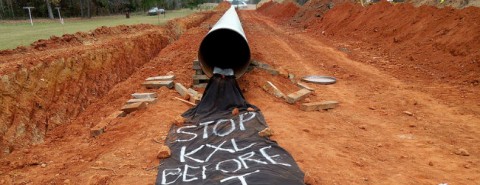Protesters in the pews: Young pipeline resisters come to worship
Be careful what you pray for”—a variation on the old adage “Be careful what you wish for”—has been repeated over and over by many. We repeat it because we believe there’s some wisdom in it. It’s shorthand for the theological insight that God always answers our prayers but not always in the way we want. God’s ways are not our ways.
Take our small East Texas congregation, for example. For several years we have worked and prayed to have a young adult ministry. Located up the road from a state university, we get occasional graduate students and we have several young families, but next to no undergrads or young adults just out of college. A couple of months ago that changed abruptly.
Last summer, construction began in East Texas on the Keystone XL Pipeline, the southern leg of a massive complex of pipelines stretching from the tar sands in Alberta, Canada, to Cushing, Oklahoma, then to Texas and finally to refineries on the Gulf Coast where the refined oil will be loaded onto tankers and shipped to places like China. Owned and constructed by TransCanada, a Canadian-based billion-dollar multinational corporation, the pipeline passes roughly 20 miles from our church and only a few miles from some of our church members’ homes. We’ve known of the proposed pipeline for several years.





